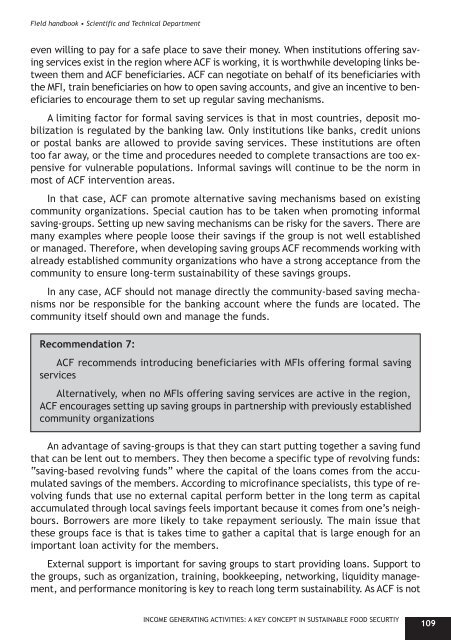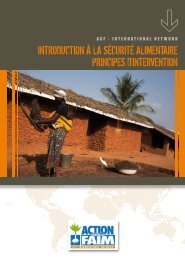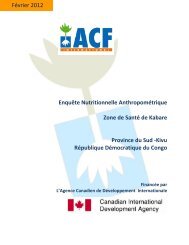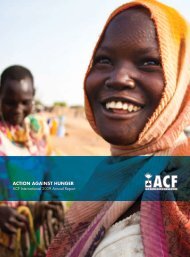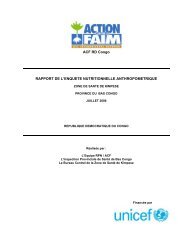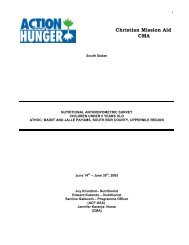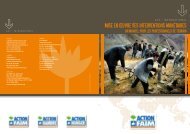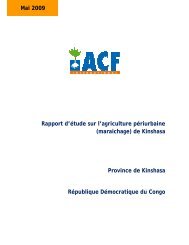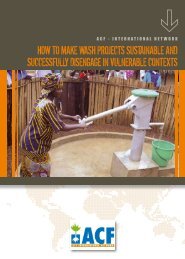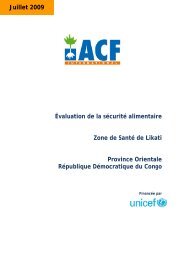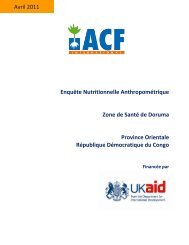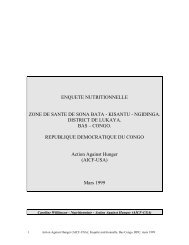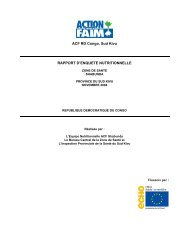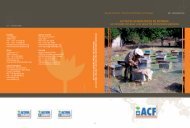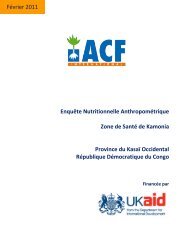Income-Generating Activities - Action Against Hunger
Income-Generating Activities - Action Against Hunger
Income-Generating Activities - Action Against Hunger
Create successful ePaper yourself
Turn your PDF publications into a flip-book with our unique Google optimized e-Paper software.
Field handbook • Scientific and Technical Department<br />
even willing to pay for a safe place to save their money. When institutions offering saving<br />
services exist in the region where ACF is working, it is worthwhile developing links between<br />
them and ACF beneficiaries. ACF can negotiate on behalf of its beneficiaries with<br />
the MFI, train beneficiaries on how to open saving accounts, and give an incentive to beneficiaries<br />
to encourage them to set up regular saving mechanisms.<br />
A limiting factor for formal saving services is that in most countries, deposit mobilization<br />
is regulated by the banking law. Only institutions like banks, credit unions<br />
or postal banks are allowed to provide saving services. These institutions are often<br />
too far away, or the time and procedures needed to complete transactions are too expensive<br />
for vulnerable populations. Informal savings will continue to be the norm in<br />
most of ACF intervention areas.<br />
In that case, ACF can promote alternative saving mechanisms based on existing<br />
community organizations. Special caution has to be taken when promoting informal<br />
saving-groups. Setting up new saving mechanisms can be risky for the savers. There are<br />
many examples where people loose their savings if the group is not well established<br />
or managed. Therefore, when developing saving groups ACF recommends working with<br />
already established community organizations who have a strong acceptance from the<br />
community to ensure long-term sustainability of these savings groups.<br />
In any case, ACF should not manage directly the community-based saving mechanisms<br />
nor be responsible for the banking account where the funds are located. The<br />
community itself should own and manage the funds.<br />
Recommendation 7:<br />
ACF recommends introducing beneficiaries with MFIs offering formal saving<br />
services<br />
Alternatively, when no MFIs offering saving services are active in the region,<br />
ACF encourages setting up saving groups in partnership with previously established<br />
community organizations<br />
An advantage of saving-groups is that they can start putting together a saving fund<br />
that can be lent out to members. They then become a specific type of revolving funds:<br />
“saving-based revolving funds” where the capital of the loans comes from the accumulated<br />
savings of the members. According to microfinance specialists, this type of revolving<br />
funds that use no external capital perform better in the long term as capital<br />
accumulated through local savings feels important because it comes from one’s neighbours.<br />
Borrowers are more likely to take repayment seriously. The main issue that<br />
these groups face is that is takes time to gather a capital that is large enough for an<br />
important loan activity for the members.<br />
External support is important for saving groups to start providing loans. Support to<br />
the groups, such as organization, training, bookkeeping, networking, liquidity management,<br />
and performance monitoring is key to reach long term sustainability. As ACF is not<br />
INCOME GENERATING ACTIVITIES: A KEY CONCEPT IN SUSTAINABLE FOOD SECURTIY<br />
109


